Stark’s Metamorphosis (an Unbiased Review of Iron Man 3)
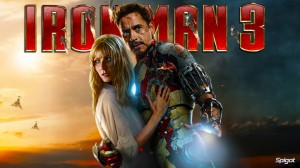 (NOTE: This post is a continuation of my earlier “unbiased” reviews of the Marvel Thor and Avengers movies, in which I presented a reading of the films positing that Loki’s apparent ‘defeats’ in both movies were intentional parts of an extremely long-term plan, and that in The Avengers, when Loki zapped Tony Stark with his mind-control rod and it seemed not to work, it actually did work, but he made Stark pretend it didn’t so that after Loki allowed himself to be ‘defeated’ and ‘captured’ no one would realize Stark was still his agent on the outside. Do I sincerely believe this is how the films are meant to be read? No. Do I enjoy them a heck of a lot more by reading them this way? Absolutely. This review is full of spoilers for the ‘plot’ of Iron Man 3.)
(NOTE: This post is a continuation of my earlier “unbiased” reviews of the Marvel Thor and Avengers movies, in which I presented a reading of the films positing that Loki’s apparent ‘defeats’ in both movies were intentional parts of an extremely long-term plan, and that in The Avengers, when Loki zapped Tony Stark with his mind-control rod and it seemed not to work, it actually did work, but he made Stark pretend it didn’t so that after Loki allowed himself to be ‘defeated’ and ‘captured’ no one would realize Stark was still his agent on the outside. Do I sincerely believe this is how the films are meant to be read? No. Do I enjoy them a heck of a lot more by reading them this way? Absolutely. This review is full of spoilers for the ‘plot’ of Iron Man 3.)
Character over plot has been a signature of these Marvel films, as the main events grind on in the background and we focus instead on the small, human experiences of side characters like Tony Stark, which a less subtle writing team would leave undeveloped and unexplored. While Iron Man 3 offers no direct glimpse of the massing invasion which Loki is masterminding, it offers instead a detailed case study of an issue too frequently glossed over in such stories: the psychological effects of long-term mind control. Instead of seeing only the use Loki makes of his new servant, we are presented with a sensitive examination of the process of surrender and conversion.
The first quarter of the film establishes that the long-term domination of an intellect like Stark’s is far from simple. Loki’s control is not weakening, but the unwilling mind is in turmoil, and breaking down. The directors use no ham handed cliches, like a sinister Loki voice-over in Stark’s head, but show the realistically imagined symptoms of such a mental battle: sleeplessness, hyperactivity, memory loss, breakdowns in social interaction, eventually panic attacks, which trigger especially when those around Stark bring up New York, the aliens and the Avengers, topics which require him to directly lie to conceal the control, putting the most pressure on his deception. If this continues, Stark will break down. If he is to be useful to his new master, the former self sleeping inside him must succumb, accepting his new identity as a servant of Loki. It is this process we watch as the film unfolds, starting from Stark’s opening line about how we “make our own demons,” referring, of course, to his fear that he is becoming a demon as he gives in.
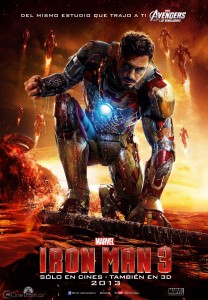
The initial flashback to 1999 shows how early Loki sowed the seeds we will see blossom. We instantly recognize that the regenerating plant effect, which mad science botanist Dr. Hansen is researching, cannot be human technology, and must be based on the effects of the Well of Urd which the Aesir use to regenerate Yggdrasil every day, though the exploding side-effect is clearly an enhancement by our favorite Jotun. This event is years before Loki’s mind control took hold, so the audience is left guessing from the start: who is Loki watching here? Stark, the conspicuous genius? Or this woman Hansen, to whom he gave this power? Does she know? The answers come only toward the end of the film, when we come to understand the real import of the name tag reading “You Know Who I Am” – a message for the audience more than the characters that the true, hidden protagonist of these films is with us.
The main plot sparks when Stark, and the greater intellect which watches through him, encounters the completed form of the Well-of-Urd-based regeneration formula. Obviously-corrupt mad scientist Aldrich Killian (a colleague of Hansen) enters Stark’s headquarters and shows Pepper Potts a holographic demonstration of the work his group AIM has done inserting Well-of-Urd regeneration into humans, and thereby creating precisely the effect that the hosts of Valhalla are supposed to enjoy: fighting, hacking off limbs and rising to fight and feast again (hereafter I shall refer to this by its obvious true name, the “Valhalla Serum”). Loki’s hand is clear in the beautiful irony of the “Valhalla Serum” offering the same bribe Odin gives his chosen (with a super bonus heat-generating power added).
But, we realize, this research has matured while Loki is imprisoned in Asgard, an inconvenient necessity serving his larger goals, which means he does not actually have access to the finished Valhalla Serum formula, nor access to AIM’s current plans. He seeded the research, but could not guide it further–at least not until it crossed his new servant’s path. This happens when Stark’s security chief and friend Happy Hogan shows Stark the scene of Killian showing his holographic data display to Pepper Potts. The data display, which Loki-through-Stark glimpses through Hogan’s tablet camera, is enough to confirm that what Killian has must be the mature form of the Valhalla Serum. In an elegant moment of planning for deniability, Loki has Stark pretend that Hogan fails in his attempts to re-orient the camera toward Killian’s display, convincing Hogan that Stark never even saw Killian’s data, so he can thereafter claim not to know about it. This is one of a number of steps Loki has Stark take to alienate Hogan, who, of course, as an old friend is the most likely person to notice Stark’s changed behavior and suspect mind-control, so Hogan is systematically pushed away until he can be conveniently left in a coma. The explosion which leaves Hogan incapacitated also gives Stark and Loki their first glimpse of the delicious power of the mature Valhalla Serum. From this point, gaining AIM’s finished Valhalla Serum (and other research) becomes Loki’s secondary goal, the primary, of course, being breaking Stark to his control.

Loki then has Stark publicly challenge this infamous terrorist “The Mandarin” and invite him to attack Stark at his home. The viewer is left wondering: does Loki know at this point that the Mandarin was a puppet of Killian and AIM, or did he, like Stark and the viewer, discover it when Hansen revealed it? After all, the Mandarin plan was Killian’s, presumably developed quite recently, while Loki was imprisoned in Asgard. Is it a plan he seeded before he let himself be captured? Can we believe that his command that Stark challenge the Mandarin was mere chance? Or did he know? The idea that he might not know, that he might be improvising, is an entertaining one, and the authors let us believe it for a while, since there are three direct benefits to challenging the Mandarin which Loki could easily have seen even if he did not realize the connection between the Mandarin and his Valhalla Serum:
First, the destruction of Stark’s house (the inevitable consequence of the challenge) provides a powerful psychological marker for the internal destruction of his past self, making it easier for Stark to think of his past free self as a lost self, and his new self as having no home to return to other than that provided by service to his new master. This destruction of the past is completed at the film’s end when all the old suits are destroyed – a new beginning for a creature with a new purpose.
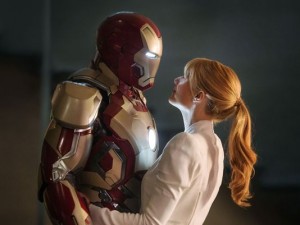
Second, by putting Pepper Potts in danger, the attack sets up for the first of the great carrots Loki offers Stark as a reward for his surrender. Stark can easily see that a superhero’s girlfriend will constantly be in mortal peril, but if Loki can give him a complete and stabilized Valhalla Serum then Potts can be made indestructible and therefore safe, a fit reward for a loyal servant. Loki dangles this danger, and his offer, before Stark through the whole latter two-thirds of the film, when he guides Stark’s actions toward ensuring that Potts is kidnapped by Killian. Loki and, presumably, Stark as well already know that a regeneration serum is the heart of this scheme, and knowing how mad scientists always like to turn the “girl” into “their creature” it is obvious that Killian will give Potts the serum. Of course, Killian’s version is unstable – only Loki can grant Stark the final steps necessary to make a perfected version, which he does at the end of the film.
Third, and most obvious, Stark’s challenge brings the focus of the Mandarin, the US government and the world upon Stark, setting up a fresh opportunity for “Iron Man” to save the world (and especially America) from a great threat. This wins Stark greater trust and security clearances, which we saw Loki already make such great use of in the Avengers film, where he used Stark to gained access to S.H.I.E.L.D. and Stark Enterprises’ security systems. Stark’s flashy digital review of data on the Mandarin reminds the viewer that he has already given his new master access to Police, CIA, FBI records etc., but more trust is always worth winning, and taking down this great terrorist threat is an easy and fun opportunity to gain further inroads into human governments. When Stark convinces James Rhodes (the pilot of War Machine) to give him his access password, on the excuse of helping thwart AIM and the Mandarin, Loki gains full access to AIM’s plans and research, as well as to new levels of NSA clearance. Thus, during the hilarious scene in the tech van where Stark meets his obsessive fanboy, Loki is obtaining all data on the Valhalla Serum, as well as many other secrets of AIM and the US government, while in the fanboy Stark faces a reminder of how ridiculous his narcissism is, another hint of how much he will benefit if he lets Loki help him mature into something new.
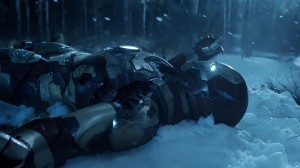
The maturation of the AIM/Mandarin plan has several small but commendable boons for Loki’s side. War Machine, the only Iron Man suit not under Stark’s direct control, is hijacked by the enemy and thereby discredited in the eyes of a trusting government, which is led thereby to rely even more on Stark’s personal reliability. The US president is kidnapped and personally rescued by Stark, engendering gratitude which will lead to even blinder future trust, and the Vice President is removed and replaced, presumably, with a figure Loki prefers. The final battle is also an excellent opportunity to test the full range of Stark’s autonomous armor, though the suits deployed there must all be destroyed afterwards, since presumably S.H.I.E.L.D. and other Earth forces were watching the battle closely, and will develop counters for any suit deployed there – best to scrap them and trust to the new, superior ones which the newly-reborn Stark, Servant of Loki, will create (we have already had hints of stealth gear in planning). (We can only imagine what delightful distraction Loki cooked up to keep S.H.I.E.L.D. and the rest of the Avengers busy while he is playing with Stark and the Mandarin–perhaps we can hope to see that in another film.)
It is, incidentally, during the final rescue of the President that Stark makes his one slip and shows how much his mind is being taken over by the Norse worldview, when he realizes they intend to burn the President and instantly calls it “A Viking funeral.” He tries to cover, overcompensating with the wildly out-of-character Christian blessing gesture and the line, “It’s Christmas. Take ’em to church,” line. Naturally War Machine is too thick to spot the slip, but it is a fun touch, and proof of how excited Stark is to get to see Potts after her Valhalla Serum transformation.
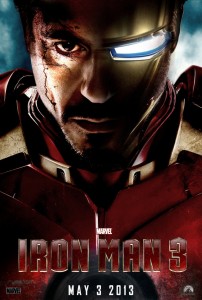
The Mandarin is, of course, secondary. The true conquest occurs within Stark himself. I called this a game of carrot, stick and mirror. We had the carrot in granting the Valhalla serum to Pepper. A second carrot is revealed at the end when suddenly, out of nowhere, Stark figures out how to remove the shrapnel from his heart, an impossible medical feat which he himself is, as we know, incapable of, so it must be a boon from a superior intelligence. We had the stick in the destruction of Stark’s house, and other points at which his master forced him to endure hardships, though, as the film matures, it becomes clear (to the viewer and to Stark) that most of Stark’s pain is being brought on, not by his master, but by his own resistance.
The mirror is a special touch, supplied by figures of Maya Hansen and Aldrich Killian, both genius scientists like Stark, who have themselves gone through a process of corruption and surrender. In them Stark sees what he thinks he will become if he succumbs, the “demon” he fears. Their example makes him more determined to resist. Yet, as he confronts them (in the scene where they have captured him and tied him to a bedframe) he realizes they are not what his master would have him become. They are weak and petty, fractious, self-absorbed, serving no greater plan. Fools. Fools who failed the test, and we see now there was a test, as we realize at last what really happened in 2009 when Loki seeded the Valhalla serum to Hansen. Hansen shows Stark the old name tag he left with her in 2009, with “You Know Who I Am” on the front, and on the reverse the formula for the next stage of the Valhalla Serum. Hansen thinks Stark wrote it, but Stark says he does not remember writing it. The truth is obvious: Loki left the formula, as he must have left other seeds for Hansen before, testing to see if she was smart enough to realize these were not human achievements but products of an inhuman genius. By leaving the formula on a paper connected to a famous genius, Loki tests Hansen: is she foolish enough to believe Stark wrote this, or will she realize there is something greater reaching out to her? Hansen failed the test, so Loki abandons her.
Stark passes. He says nothing, but he realizes when he sees that formula that it is no work of his. It is this that shows him just how much smarter he is than these other “fallen geniuses” he had thought were mirrors of himself. He realizes now that the transformation he is undergoing is entirely different from their weak corruption. The determination to “not be like them” vanishes, replaced by fresh awe for the scope of intellect, both his own intellect, for passing the test, and his master’s, for weaving such wonders. In that moment Stark realizes how much greater he can become, how much more he can accomplish, if he throws away the flash and brawn of Iron Man and allows his new master to guide him toward his true calling: the full exercise of his intellect. This is one central step in his metamorphosis.

The other, of course, is contact. Stranded by his suit’s malfunction, Stark just “happens” to come across the convenient little boy genius “Harley Keener”, who has been active in the area near the first successful Valhalla Serum blast. “Harley” has a shed full of equipment, a conspicuous lack of interfering parents, in-depth knowledge of the blast zone where the Valhalla Serum activated, and an uncanny ability to poke at Stark’s weak spots (New York, aliens), egging on his transformation. The boy tells a story about being abandoned by his father, a story which is a little too… familiar. Even his potato gun is a very familiar shade of green. It is this “Harley” who pushes the change, who urges Stark to stop thinking of himself as a fighter and think of himself as a smith (“mechanic”) again, who makes him realize his mind, not his suit, is his true weapon. A second test unfolds here: will Stark recognize his master? Will he realize the great honor he has been granted, being invited to work side-by-side with the Great Intellect in this dwarf-like improvised smithy? The worthy outpouring of gifts and tribute which Stark sends to the “child” at the end of the film confirms that he passes this test too.

We do not yet get to know how Loki is able to manifest while still in prison. Did he slip out and take this form? Is this a boy priest he is possessing? Is this an illusory projection? The possibilities are thrilling, and Loki’s presence on the scene of the first Valhalla Serum blast confirms to us at last that he must indeed have known about the AIM Mandarin scheme from its inception, since it was conceived to cover up these blasts and make them seem like the work of a terrorist instead of scientific accidents. If Loki was there from blast one, we can easily assume he was watching Hansen, Killian and AIM as the Well-of-Urd seeds he planted bore their sweet, explosive fruits.
“My armor was never a distraction or hobby it was a cocoon, and now I’m a changed man. You can take away my house, all my tricks and toys, but one thing you can’t take away. I am Iron Man.” This conclusion, from Stark’s own mouth, marks the end of his transformation, and confirms that this was always about his rebirth as Loki’s servant. He receives his rewards–the perfected Valhalla Serum for Potts, the healing of his heart–but the greatest reward is self-discovery. Genius is stronger than iron. Brains over brawn, Loki’s subtlety over Thor’s force, smithcraft over hack and slash. That is what Iron Man is, and always should have been. Stark is ready now to become greater than he has ever been, and serve something greater than any human has ever served: his master’s Plan.
Where, then, does this sideline character sketch leave our central protagonist Loki? We know he remains physically in his Asgardian prison, but this film reassures those of us who were worried that he might be suffering in the boredom of such confinement. We had assumed he had plans for his months of imprisonment, but it is comforting to have this confirmation that his reach remains long, and his plans active. And we have uncovered new facets of his character: generosity, and delight in intelligence in all its forms. He watched Stark for years, long enough to recognize not only the potential utility of this human genius but also the flaws preventing him from achieving his full potential. Given power over Stark, Loki could break him viciously, but instead he breaks him kindly, helping him to actualize his hitherto stunted potential. Our prince of intellect, it seems, loves intellect in others, even in humans, enough to cultivate it when he can reach it. Certainly Stark will make a more valuable servant this way than if he were simply broken, but the patience, the rewards, and the hands-on touch of a personal visit all establish this as more than mere utility. We have been shown a rare glimpse of the kinder face of our mastermind. Months of prison have not made him bitter; they have made him subtler.

